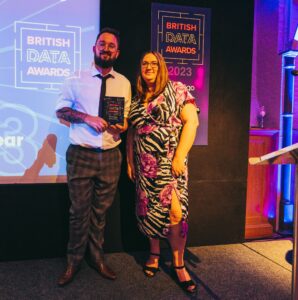What do Loreen, Ben Whishaw and Essex County Council’s Data and Analytics team have in common? That’s right, they’ve all won something big in the last week.
While Loreen was delighting the world (probably) with her winning song at Eurovision, and Ben Whishaw was sweeping up best leading actor at the BAFTAs, we were taking home a couple of gongs of our own from the British Data Awards. Not to be too West Ham about it, but we don’t even have a trophy cabinet to put them in.

In total we were shortlisted for four awards – Innovation of the Year, Public Sector Organisation of the Year, Data for Good Initiative of the Year, and an individual nomination for analyst Nick Philo for Rising Star of the Year – and managed to take home accolades for Innovation of the Year AND Public Sector Organisation of the Year.
I’ll explain more about what the awards were for, but I wanted to start off by talking a little about what this means for us as a team.
Not many people go into a data profession with the aim of winning awards, and even fewer go into a data profession in the public sector to do so. When we interview new candidates we very rarely hear “I’d love to win something” when we ask why they want the job. The main thing we tend to hear is “I want to make a difference to the local community.” As a team and as a group of professionals, we are aware that the work we do can have a profoundly positive effect on the world around us. We want to make a difference, we want to create impact, and we want the people in our communities to have the best opportunities to succeed in life. We believe that analytics and data can support our organisation to make good decisions and create good impact. That’s why we come to work, that’s why we don’t look to leave.
There is a general view that the public sector is miles behind the private when it comes to things like use of data and technology. That’s a view that permeates around us, and I think has become sort of internalised by us as a team. We often play down our successes and instead focus on what hasn’t been accomplished yet.
Perhaps because of this, we were absolutely not expecting to win anything last week at the British Data Awards. But win we did. For me, and for the team, winning that award as a public sector organisation, up against multinationals, consultancy firms and digital start-ups, serves as an important reminder that we are further along the track of data maturity than we allow ourselves to acknowledge.
We are innovators, it turns out.
I said I’d explain a bit about the projects that won the awards.
Innovation of the Year Award
Anyone reading this will be aware of the reality of rising inflation and the cost of living in the UK. This has been an incredibly difficult year to live in the UK, no matter who you are (he says, wishing to avoid a rant about fair distribution of wealth), but the reality is that there are some groups of people who experience the sharper end of such challenges. The sad truth is that there is a wealth of evidence that tells us that child poverty and deprivation tend to be mirrored by patterns in numbers of children in care
The work that we completed to win Innovation of the Year was to understand how child poverty may be impacted by changing interest rates, and, subsequently, how child poverty may affect numbers of children in care in the coming years. To complete this work, we collaborated with Professor Callum Webb from the University of Sheffield, who offered us some fantastic advice and guidance. This project enables the organisation to have a better understanding of the potential future that we face in Children’s services, and – ultimately – prepare ourselves for the challenge.
Public Sector Organisation of the Year Award
Separately, the work that won us the Public Sector Organisation of the Year award was related to our programme of work to build data literacy and develop a data informed culture to drive change and deliver our data strategy.
Our work on data literacy began at pace in May 2022 with the delivery of a data literacy session for the Government Data Science Festival, sharing our data literacy ambitions, definitions and early work to build organisational understanding and engagement so that our colleagues could better work with, communicate and reason with data.
We collaborated with the Office for National Statistics and Government Data Science Unit to adapt their successful Data Masterclass, designed for central government, to meet the needs of our audience in Essex. As a result, we became the first local government organisation to roll out this data literacy programme. Significant in the success of that programme was the enthusiastic participation from our senior leaders. As a result, together we’ve been able to accelerate our collective data literacy, along with advocacy, and – crucially – action being taken from insight.
Consequently, we are now embedding an organisational-wide literacy programme that includes e-learning, regular events, communities of practice and interest, increased access to insight and expertise and we have a blueprint for change that we are sharing across the Essex system. This serves as another reminder that we in the public sector should celebrate best practice more frequently, sharing our skills, knowledge, and experience to support each other through challenges and build one another’s understanding.
Receiving these awards was a special moment. Yes, because it’s great to be recognised, but more so because it reinforces something that I’ve known for a long time. The public sector is filled with extraordinarily talented, dedicated people, who just want to make a difference.